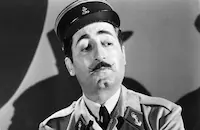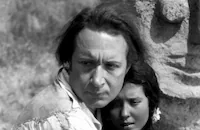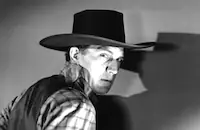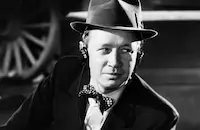San Antonio

Brief Synopsis
Cast & Crew
David Butler
Errol Flynn
Alexis Smith
S. Z. "cuddles" Sakall
Victor Francen
Florence Bates
Film Details
Technical Specs

Synopsis
By 1877, cattle rustling in Southwest Texas has driven away many cattle ranchers. One who has stayed behind to fight the rustlers is Charlie Bell of San Antonio. When Charlie learns that his friend, Clay Hardin, is planning to return to Texas from his hideaway in Mexico, he crosses the border to warn him that his life has been threatened by the rustlers. Clay responds that he has acquired proof against Roy Stuart, the head of the rustlers, and plans to use it to put Stuart in jail. Despite the efforts of Stuart's men, Clay safely crosses the border and rides into San Antonio in a private coach, which is also carrying singer Jeanne Starr, who has a job singing in Stuart's saloon. Clay attempts to present his evidence, a tally book that records the sale of stolen cattle, to the soldiers at a nearby garrison. In the absence of the commanding officer, however, no action can be taken, and Clay decides to hold on to the tally book for the moment. When Legare, Stuart's partner, learns about Clay's evidence, he wants to obtain the book and use it against Stuart for his own purposes. One night, Jeanne invites Clay to visit her backstage, and Charlie, worried that Jeanne may be involved in a plot against Clay, keeps the tally book. Legare witnesses the exchange, and later, when Stuart tries unsuccessfully to kill Clay, he shoots Charlie and steals the tally book. The murder is witnessed by Sacha Bozic, Jeanne's manager, who fearfully denies that he has seen anything. During the inquiry into Charlie's death, Sacha reveals nothing, but Stuart quickly discovers that Legare committed the murder when he demands that Stuart share his cattle business with him in return for suppressing the evidence. When the cavalry leaves town, Clay is temporarily appointed to be marshal. Stuart then summons all his men to town, and this action convinces Clay that he does not have the tally book himself. Clay tells Stuart that he believes him to be innocent, but refuses to make a deal with him. Clay then arrests Legare, but when they try to leave the saloon, a gunfight ensues and Legare escapes. Stuart chases Legare into the ruins of the Alamo and kills him, and then rides out of town, pursued by Clay. Clay finally catches Stuart, who is killed during the ensuing struggle. Clay returns to San Antonio with the tally book to find that Jeanne is leaving town. He swings aboard her coach and tries to talk her into staying with him. Jeanne inadvertently reveals that she, too, is a Texan and does not protest when Clay orders the coach to return to San Antonio.

Director
David Butler
Cast

Errol Flynn

Alexis Smith

S. Z. "cuddles" Sakall

Victor Francen

Florence Bates

John Litel

Paul Kelly

Robert Shayne

John Alvin

Monte Blue

Robert Barrat
Pedro De Cordoba

Tom Tyler
Chris-pin Martin
Charles Stevens
Poodles Hanneford San Antonio Stage Driver
Doodles Weaver

Dan White
Ray Spiker
Al Hill
Wallis Clark

Harry Cording
Chalky Williams
Bill Steele
Howard Hill
John Sheridan
Allen E. Smith
Arnold Kent
Joe Dominguez
Dan Seymour
Zedra Conde
Eva Puig
Dolores Lamar
Norman Willis

Eddie Acuff
Si Jenks
Jasper Palmer
Fernando Alvarado

Brandon Hurst
Robert Dudley
Harry Lamont
Robert Espinoza
José Alvarado
Jack Stroll
Fred Kelsey
Harry Seymour
Francis Ford

Don Mcguire
John Compton
Brad King
Johnny Miles
Hal Taliaferro
Walter De Palma
Eddie Waller
Henry Hall

James Flavin
Rodney Hildebrand
Carl Harbough
Lane Chandler
William Gould

Jack Mower
Crew
Milo Anderson
Everett A. Brown
Robert Buckner
W. R. Burnett
Gordon M. Davis
Frederick De Cordova
Paul Detlefsen
Leonard Doss
Leo F. Forbstein
Charles David Forrest
Hugh Friedhofer
Bert Glennon
Ray Heindorf
M. K. Jerome
Natalie Kalmus
Charles Kisco
William Kissel
Ted Koehler
Mario Larrinaga
Alan Lemay
E. Kenneth Martin
Jack Mcconaghy
William Mcgann
Irene Morra
George Nogle
Jack Scholl
William Skall
Ted Smith
Larry Spier
Max Steiner
Bertram Tuttle
Willard Van Enger
Jack L. Warner
Perc Westmore

Film Details
Technical Specs

Award Nominations
Best Art Direction
Best Song
Articles
San Antonio
Flynn's good friend Alexis Smith was cast as the singer from back East, but she was not around for much of the shooting, first because of her obligations to complete production on The Horn Blows at Midnight (1945) and second due to a mysterious viral ailment that dragged on for weeks. Smith and Flynn had appeared together prior to this in Dive Bomber (1941) and Gentleman Jim (1942), and would go on to make two more pictures together after San Antonio, including another Western, Montana (1950). She retired from movies after breaking her back in a horseback riding accident during filming of The Young Philadelphians (1959), but after winning a Tony Award for her performance in the Stephen Sondheim musical Follies in 1972, she made a film comeback. She continued to work in both movies and television until her death a few months before the release of her last picture, Martin Scorsese's The Age of Innocence (1993). Smith was married to actor Craig Stevens (TV's Peter Gunn) from 1944 until she died.
Alexis Smith wasn't the only one whose illness held up production on San Antonio. Flynn caught the flu in the damp outdoor shooting at Calabasas and was out for an extended period. He was still not fully recovered when he finally returned to the set to shoot the climactic free-for-all fight, four months after production began. He was still so sick that many of his shots had to be doubled. The sequence ended up taking 12 days to film and a lot of it had to be redone before the picture could be released. Beyond the illness, however, Flynn was reliable and didn't engage in some of his notorious bad habits; he arrived on the set promptly with his lines memorized and ready to shoot. Production manager Frank Mattison noted rather coldly in his reports, "We'd better not slap him on the back, because it may not happen again."
Although unhappy about doing another Western, Flynn did appreciate the opportunity to learn to play guitar for a ditty he performed on screen called "Put Your Little Foot Out," one of three songs in the movie. Another, "One Sunday Morning" by lyricist Ted Koehler and composers Ray Heindorf and M.K. Jerome, received an Academy Award nomination. Although it didn't win, Heindorf did win for three other pictures out of 15 nominations received over the course of his long, successful film scoring career. Smith's singing of the nominated song here was dubbed, oddly enough considering her Tony win for singing on Broadway. Another irony: although they had Heindorf and company on hand, the studio chose to recycle the Max Steiner theme music from Flynn's earlier Western Dodge City.
San Antonio also got an Oscar® nod for its impressive Technicolor art direction and set decoration but lost to the lavish period adventure-romance Frenchman's Creek (1945).
Director: David Butler
Producer: Robert Buckner
Screenplay: W.R. Burnett, Alan Le May
Cinematography: Bert Glennon
Editing: Irene Morra
Art Direction: Ted Smith
Original Music: Ray Heindorf and M.K. Jerome, Max Steiner
Cast: Errol Flynn (Clay Hardin), Alexis Smith (Jeanne Starr), S.Z. Sakall (Sacha Bozic), Paul Kelly (Roy Stuart), Victor Francen (Legare).
C-109m. Closed captioning.
by Rob Nixon

San Antonio
Quotes
Trivia
Notes
According to a September 25, 1944 Hollywood Reporter news item, actor Harry Carey was released from the film at his own request because he was dissatisfied with his role. He was to have played Errol Flynn's sidekick. Pre-production press releases included in the file on the film at the AMPAS Library state that former Olympic athelete Jim Thorpe was to play an Indian chief in the picture and Raoul Walsh was scheduled to direct it. Ted Smith and Jack McConaghy received an Oscar nomination for Best Art Direction-Interior Decoration in a color film, and "Some Sunday Morning" was nominated for Best Song.















